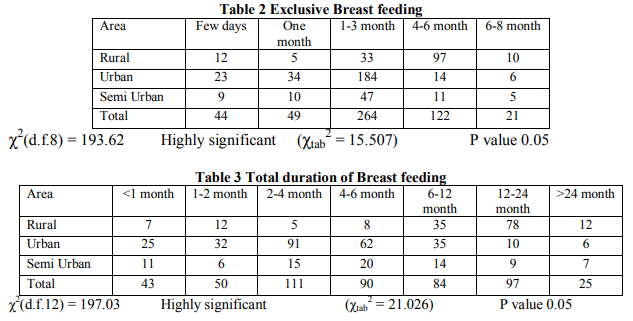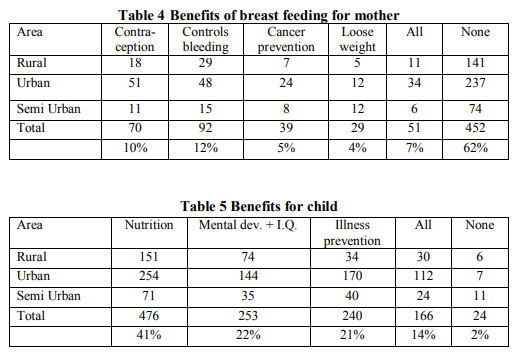IJCRR - 5(13), July, 2013
Pages: 64-68
Date of Publication: 17-Jul-2013
Print Article
Download XML Download PDF
ASSESSMENT OF BREASTFEEDING PRACTICES IN UDAIPUR CITY AND ADJOINING RURAL AREA
Author: Mittal Hemlata, Mishra R. Simmi, Mathur H.N.
Category: Healthcare
Abstract:Breastfeeding, a component of primary health care has been identified world over as greatest protection of child health. Irrespective of the fact that breastfeeding in India is universal, psychological barrier still exist in early breastfeeding. Hence a study was conducted to assess breastfeeding knowledge, practices and factors influencing them among women in Udaipur city of Rajasthan.Objective:1) To study prevalent breastfeeding practices in mother's who have nursed in last five years.2) To assess knowledge of respondents on different issues of breastfeeding. Material and methods: The study was conducted in Geetanjali Medical College and Hospital and its urban and rural health centres. 5oo women who had nursed in last 5 years were interviewed using structured proforma. Results: Our study showed that exclusive breastfeeding and total duration of breastfeeding was not as per the WHO/UNICEF recommendation. Significant differences found in Urban/Rural/Semi urban area.62% mothers were unaware of benefits of breastfeeding to mother though 98% were aware of benefits to child. Conclusion: This study emphasises that mother should be educated and motivated for exclusive breastfeeding their babies for 6 months and continue breastfeeding till 2 years. The benefits of breastfeeding for mothers should be explained for this purpose.
Keywords: Exclusive breastfeeding , duration of breastfeeding, benefits of breastfeeding.
Full Text:
INTRODUCTION
Breastfeeding, a component of primary health care has been identified world over as greatest protector of child health. It is fundamental for child’s growth and development and also has great protective potential against major killer diseases of childhood. The World Health Organisation(WHO)/United Nation Children Fund(UNICEF) jointly recommend that women exclusively breastfed their infants for the first 6 months and continue to breastfed into the second year of life or longer. The importance of breastfeeding, especially EBF, is well established for the infant, the mother and the family. In those settings when infant formula is used, they are introduced early and overdiluted. 1 The practice of exclusive breastfeeding depends on various factors related to both mothers and their environment, including the services delivered by health professionals. It is known that support and counselling by health professionals can improve rates, early initiation and total duration of breastfeeding, particularly EBF.1 These scientific facts and knowledge need to be conveyed to nursing as well as potential mothers so that they not only breastfeed the child but correctly breastfeed the child. The attitudes and practices of breastfeeding differ in different segments of society .They depend on traditional cultural practices and taboos prevalent in different groups and knowledge and attitude of women folk. The scientifically correct practices need to be adopted. With this thought an assessment of breastfeeding practices in different segments of society was conducted in Udaipur city and its adjoining rural area.
MATERIALS AND METHODS
This cross sectional study was conducted by Department of Community Medicine Geetanjali Medical College and Hospital,Udaipur. Mothers who had nursed their children in last five years were interviewed using a structured Performa. It included information on socio cultural, economic, educational and vocational aspects of respondents besides questions on different aspects of breastfeeding. Information was collected about nursing practices for youngest child. The subjects of study included
1. Women residing in field practice area of urban and rural health centre.
2. Patients and attendants visiting GMCH(mainly paediatric and OBG dept).
3. Labour class domestic servants.
4. Teachers from secondary schools, STC, and colleges(Government and private schools).
5. Nursing and medical staff doctors executives and other working mother.
6. Traditional birth attendants, VHG and Anganwadi workers.
Permission was sought from concerned authorities for this study explaining them the purpose of exercise and fixing time and place. Clearance was obtained from the Ethical committee of the College for the study
RESULTS
500 mothers were interviewed over a period of 6 months.52% population was from the urban area, 17% were from semi urban and rest from rural.72 percent mothers initiated breast feeding on the first day with 83% feeding their new born colostrum.(Table 1) Exclusive breastfeeding was however not as per WHO guidelines with 52% mothers introducing some complementary feed or starting top feed after 3 months. There was significant difference among mothers from urban, rural and semi urban areas.(Table 2) Similarly the total duration of breastfeeding was also not as per recommended norms with most mothers see (table 3) discontinuing by one year. The total duration of breastfeeding is less than 24 months in among all three sections and there is significant difference in duration. The benefits of breastfeeding to mother are poorly known to mothers themselves as reflected in the table above.42% women know it controls bleeding but just 5% and 10% mothers know it helps prevent cancer and act as a contraceptive respectively. (Table 4). 41% of mothers are aware of nutritive value of breast milk but only 21% know it is protective against illness.(Table 5) The most common galactoguoges across rural, urban and semi urban used were “gond laddos” which are traditionally given in Rajasthan. 80% rural women were unaware of any ayurvedic or allopathic medications that are available to increase lactation, while 89% semiurban and 90% urban women were aware of the preparations that help increase milk secretion.



DISCUSSION
WHO recommends early (i.e. within one hour of giving birth) initiation of breastfeeding. A recent trial has shown that early initiation of breastfeeding could reduce neonatal mortality by 22% which would contribute to the achievement of the Millennium Development Goals. Though the advantages of breastfeeding are significant, the duration and patterns of breastfeeding vary a great deal within India. Studies indicate exclusive breastfeeding until 4-6 months of age to be beneficial to infant survival, but globally exclusive breastfeeding rates are still too low in early infancy.2 Breastfeeding should be initiated within 30 minutes of delivery. The delay in initiation will lead to a delay in the development of oxytocin reflexes, which are very important for the contraction of the uterus and the breast milk reflex. In our study, almost all the mothers initiated breastfeeding within 1 hour of childbirth, which is a good practice. Studies comparing the early onset of breastfeeding on the development of newborns and on their mothers and those studies in which breastfeeding had begun on the 6 th hour after birth show that the earlier breastfeeding begins, the earlier and more effective the consolidation of the process and therefore a better impact on the after-birth period, which helps in the earlier initiation of the secretion of breast milk.3 It protects the child from malnutrition, infections, and helps the overall development of the child. Only 40% of the mothers were doing exclusive breastfeeding, the remaining 60% of the mothers were not. They prematurely start weaning the child, which may lead to the development of infections and may have a long-term effect on the physical growth of the child.3 As a global public health recommendation, exclusive breastfeeding should be practiced for the first 6 months of life, to achieve optimum growth, development and health. In India breastfeeding is almost universal, but the EBF is quite low4 Indian Academy of Pediatrics recommends exclusive breastfeeding for the first 4-6 months followed by sequential addition of semisolid and solid foods to complements breast milk until the child is gradually able to eat the normal family food at around one year of age.5 The median duration is 18.4 months across countries.6 Some studies says that breastfeeding can significantly reduce the risk of cancer death in mothers because longer breastfeeding means fewer menstrual cycles and reduced lifetime exposure to the hormonal factor, especially estrogen, that influence breast cancer risk.7 It is evident that even the most sophisticated and carefully adapted formulae can never replicate human milk, as human milk has anti infective properties, and is a live fluid which cannot be mimicked in an artificial formula. An adequate supply of human breast milk is known to satisfy virtually all the nutritional needs of an infant at least for the first 6 months of life. Breast milk, and especially colostrum, in the long term, prevents atherosclerosis, hypertension, and obesity; it also prevents allergy to non specific proteins and develop immunity. Breastfeeding has a vital child specific effect which is especially important in developing countries where the awareness, acceptability and availability of modern family planning methods are very low.8
CONCLUSION
The most important aspect of breastfeeding is its exclusivity for 6 months and the recommendation of continuing for 2 years to get maximum benefits for child and mother. The study highlights that though women from rural, urban and semi urban are aware of the benefits of breast feeding; ideal breastfeeding is still not achieved. Mothers need to be educated about these aspects as well as that they too benefit immensely through it during antenatal classes, or when they visit health services during pregnancy.
References:
1. The breastfeeding week celebrated during 1st week of August can serve as an important platform to advocate the same. Abba AM, Koninck MD, Hamelin AM. A qualitative study of the promotion of exclusive breastfeeding by health professionals in Niamey, Niger. International Breastfeeding Journal 2010, 5:8 doi: 10.1186/1746-4358-5- 8 available on www.internationalbreastfeedingjournal.com/c ontent/5/1/8
2. Bandyopadhyay M. Impact of ritual pollution on lactation and breastfeeding practices in rural West Bengal, India. International Breastfeeding Journal[Internet]. 2009,4:2 doi: 10.1187/1746-4358-4-2 available on www.international breastfeeding journal.com/content/4/1/2
3. Madhu K, Chowdary S, Masthi R. Breastfeeding Practices and Newborn Care in Rural Areas: A Descriptive Cross-Sectional Study. Indian Journal of Community Medicine 2009;34:243-6.
4. Oommen A, Vatsa M, Paul VK, Aggarwal R. Breastfeeding Practices of Urban and Rural Mothers. Indian paediatrics 2009;46(10):891- 4.
5. Parekh C, Bavdekar SB, Shaharao V. Study of Infant Feeding Practices: Factors Associated with Faulty Feeding. J Trop Pediatr. 2004;50(5):306-8.
6. Worldbreastfeedingconference.0rg/images/51 -country-report.pdf
7. Greenfield B. Breastfeeding for six Months Can Significantly Cut Risk of Cancer DeathAs Can Less Alcohol and Staying in Shape, Study Finds. By Beth Greenfield, Shine Staff/Healthy Living-Apr 3, 2013 by Shine.yahoo.com/healthy living/Breastfeeding.
8. Reddy S. Breastfeeding- Practices, problems and prospects. Journal of Family Welfare 1995;41:1-9.
|






 This work is licensed under a Creative Commons Attribution-NonCommercial 4.0 International License
This work is licensed under a Creative Commons Attribution-NonCommercial 4.0 International License